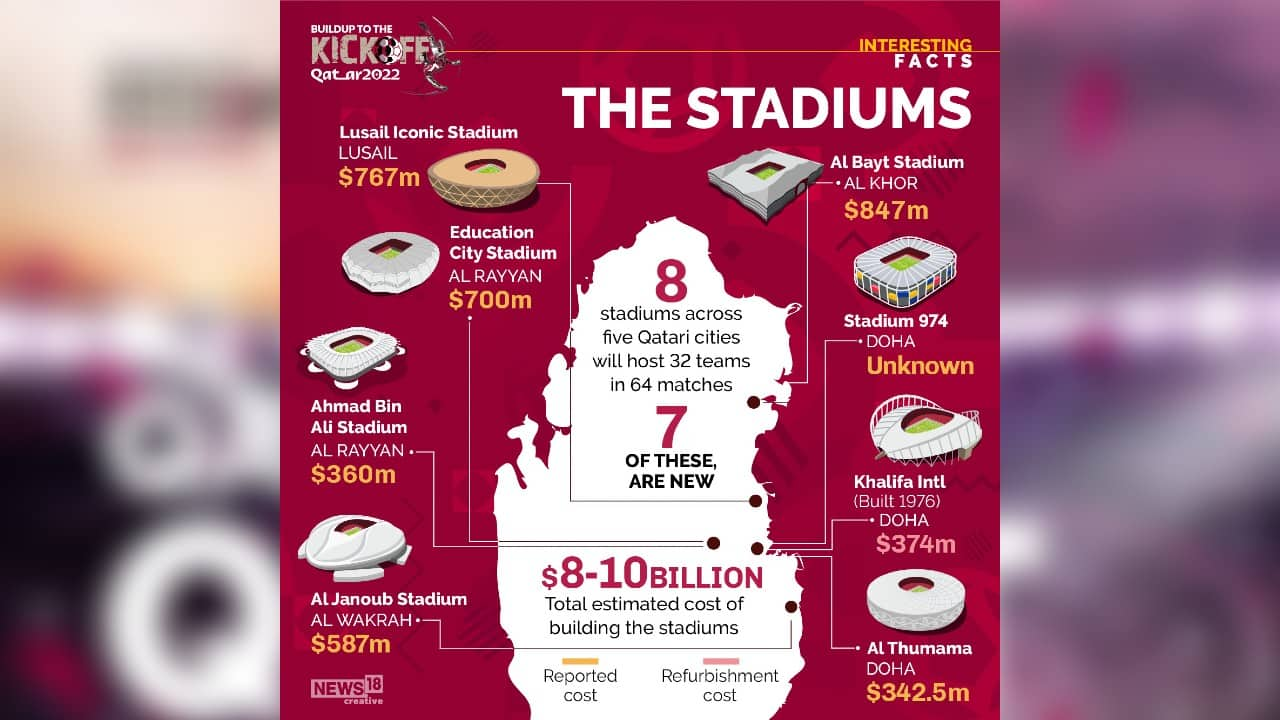
The Unprecedented Spectacle: Unique Facts About the FIFA World Cup Qatar 2022
The FIFA World Cup, football’s most prestigious tournament, has a storied history of delivering unforgettable moments, showcasing incredible talent, and uniting the world in a shared passion. However, the 2022 edition, hosted by Qatar, carved out a truly unique niche in this illustrious lineage. From its controversial inception to its dramatic conclusion, Qatar 2022 was a tournament of firsts, breaking norms, setting new benchmarks, and sparking conversations that extended far beyond the pitch. This article delves into the myriad unique facts that defined this extraordinary World Cup.
1. The First World Cup in the Arab World and the Middle East
Perhaps the most significant and groundbreaking fact about Qatar 2022 was its location. For the first time in its 92-year history, the FIFA World Cup was held in an Arab nation and the Middle East. This decision, made in 2010, was met with both excitement and considerable controversy, but it undeniably marked a pivotal moment in the tournament’s global expansion. It offered a unique opportunity to showcase Arab culture, hospitality, and passion for football to billions worldwide, while also challenging preconceived notions about the region.
2. The Unprecedented Winter Timing
One of the most disruptive yet necessary changes for Qatar 2022 was its shift from the traditional summer slot to a winter one (November 20 to December 18). This was primarily due to Qatar’s extreme summer heat, where temperatures can soar above 40°C (104°F), making football unplayable and unsafe for both players and fans. The move to winter disrupted the calendars of major European leagues, forcing them to pause their seasons mid-way, a logistical nightmare that had never before been attempted on such a scale. This unique timing also meant players arrived potentially fresher, having played fewer games than they typically would at the end of a long season, possibly contributing to the high-quality football witnessed.
3. The Smallest Host Nation by Area
Qatar, with a land area of just over 11,500 square kilometers (approximately 4,468 square miles), was by far the smallest nation ever to host the World Cup. This compact geography presented both unique challenges and unparalleled opportunities. On the one hand, it necessitated massive infrastructure development in a short period. On the other, it created an incredibly concentrated World Cup experience.
4. The Most Compact World Cup Ever
Building on Qatar’s small size, the 2022 tournament was the most compact in World Cup history. All eight stadiums were located within a 50-kilometer (31-mile) radius of the capital, Doha. This meant that fans could potentially attend multiple matches in a single day – a logistical impossibility in previous tournaments spread across vast countries. It also eliminated the need for domestic flights, significantly reducing travel time and costs for fans and teams alike. While convenient, this compactness also led to immense pressure on accommodation and transport infrastructure within the small nation.
5. The Most Expensive World Cup in History
Qatar spared no expense in preparing for the tournament, with estimates suggesting an expenditure of over $220 billion. This staggering figure far surpasses any previous World Cup, dwarfing the $15 billion spent by Russia in 2018 or the $11.6 billion by Brazil in 2014. The vast majority of this investment went into building entirely new infrastructure, including seven state-of-the-art stadiums, a new metro system, roads, hotels, and even a new city (Lusail), rather than solely on football-specific facilities. This massive outlay underscored Qatar’s ambition to use the World Cup as a catalyst for national development and a global coming-out party.
6. State-of-the-Art Cooling Technology in Stadiums
Despite the winter timing, Qatar’s climate still necessitated innovative solutions for player and spectator comfort. Several stadiums were equipped with advanced cooling technology, using solar-powered energy to push cold air through vents, maintaining comfortable temperatures on the pitch and in the stands. This sophisticated system was a testament to Qatar’s commitment to hosting a comfortable event, regardless of environmental challenges, and set a new benchmark for future large-scale sporting events in hot climates.
7. Semi-Automated Offside Technology (SAOT) Debut
The 2022 World Cup marked the debut of Semi-Automated Offside Technology (SAOT), a significant evolution in football officiating. This system used 12 dedicated tracking cameras mounted beneath the stadium roof, combined with a sensor inside the match ball, to provide highly accurate data on player positions and the exact moment the ball is played. This data, processed by AI, provided officials with real-time alerts for potential offside situations, significantly speeding up decision-making and reducing controversies, thereby improving the flow of the game.
8. The Connected Ball Technology (Al Rihla)
The official match ball for Qatar 2022, "Al Rihla" (Arabic for "The Journey"), featured an embedded sensor that sent real-time data to the VAR operations room. This "connected ball" technology was crucial for the SAOT, pinpointing the precise moment the ball was kicked, and also helped in determining deflections and other game events with unprecedented accuracy. This innovation brought a new layer of data-driven decision-making to the beautiful game.
9. Most Penalty Shootouts in a Single Tournament
Qatar 2022 saw a record five matches decided by penalty shootouts, equalling the record set in 1990, 1994, 1998, and 2006. The drama of the shootouts, particularly in the knockout stages, added immense tension and excitement, culminating in the epic final decided by penalties. This high number of shootouts highlighted the increased competitiveness and tactical parity among teams.
10. Fewest Draws in the Group Stage
The group stage of Qatar 2022 featured a remarkably low number of draws, with only five matches ending in a stalemate. This was the lowest number of draws in a 32-team World Cup group stage, indicating a greater emphasis on attacking play and a desire for outright victories, possibly influenced by the compact nature of the tournament and the unique mid-season timing.
11. Lionel Messi’s Crowning Achievement and Record-Breaking Feats
The 2022 World Cup was undeniably Lionel Messi’s tournament. He finally lifted the coveted trophy, solidifying his status as arguably the greatest player of all time. In doing so, he set numerous unique records:
- Most World Cup Appearances: 26 matches, surpassing Lothar Matthäus.
- First Player to Score in All Knockout Rounds: Group stage, Round of 16, Quarter-final, Semi-final, and Final.
- Most Man of the Match Awards: 5 in a single tournament and 11 overall.
- First Player to Win Golden Ball Twice: (2014 & 2022).
His journey and ultimate triumph were a storybook ending that captured the hearts of billions worldwide.
12. Kylian Mbappé’s Final Hat-Trick and Golden Boot
While Messi stole the show, Kylian Mbappé’s performance, especially in the final, was equally historic. He became only the second player in World Cup history (after Geoff Hurst in 1966) to score a hat-trick in a final, a truly unique feat. Despite his team’s loss, he won the Golden Boot with 8 goals, cementing his place as the next global superstar.
13. Morocco’s Historic Run
Morocco’s journey to the semi-finals was one of the most heartwarming and unique stories of the tournament. They became the first African and the first Arab nation to reach the World Cup semi-finals, defeating football giants like Belgium, Spain, and Portugal along the way. Their disciplined defense, passionate play, and unwavering support from fans across the Arab and African world made their run truly unforgettable and inspirational.
14. Upsets and Giant Killings
Qatar 2022 was ripe with unexpected results, showcasing the growing global competitiveness in football. Saudi Arabia’s stunning 2-1 victory over eventual champions Argentina in the group stage was one of the biggest upsets in World Cup history. Japan’s dramatic comeback wins against Germany and Spain, both 2-1, to top their group were also remarkable and unique instances of resilience and tactical brilliance.
15. Alcohol Restrictions in Stadiums and Public Places
Unlike any previous World Cup, Qatar implemented strict restrictions on the sale and consumption of alcohol in stadiums and public spaces. Alcohol was generally available only in licensed hotel restaurants and designated fan zones, and even there, it was heavily regulated. This cultural difference presented a unique challenge for many international fans accustomed to a more liberal approach to alcohol at sporting events, leading to a different kind of fan experience.
16. Controversies and the Quest for Legacy
Beyond the football, Qatar 2022 was unique in the sheer volume and intensity of scrutiny it faced regarding human rights issues, particularly concerning migrant workers’ conditions and LGBTQ+ rights. These controversies sparked widespread protests and debates globally, putting a spotlight on the ethical dimensions of hosting mega-events. While Qatar made efforts to address some concerns, the discussions surrounding "sportswashing" and the social cost of the tournament became an indelible part of its unique narrative, forcing a broader conversation about the values associated with the World Cup.
Conclusion
The FIFA World Cup Qatar 2022 was, without a doubt, a tournament unlike any other. From its unprecedented winter timing and compact geography to its technological innovations and the unique cultural experience it offered, it pushed the boundaries of what a World Cup could be. It delivered a spectacular sporting drama, culminating in arguably the greatest final in history, and saw legends crowned while new stars emerged.
Yet, its uniqueness also stemmed from the significant debates and challenges it ignited, particularly regarding human rights and environmental impact. Qatar 2022 will be remembered not only for the exhilarating football played on its pitches but also for the profound questions it raised about the future of global sporting events, leaving a complex, multi-layered legacy that will be dissected and discussed for years to come. It was a World Cup that redefined expectations, broke conventions, and firmly etched itself into the annals of football history as truly one of a kind.



